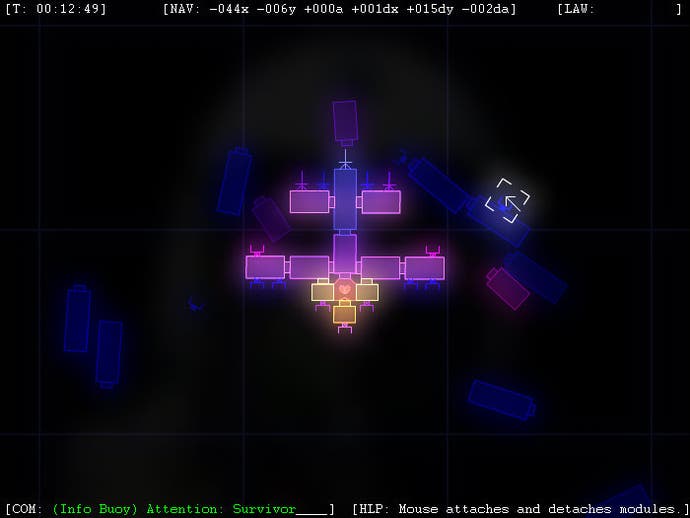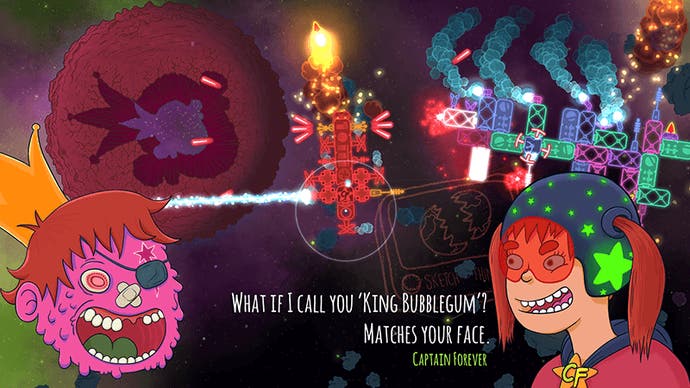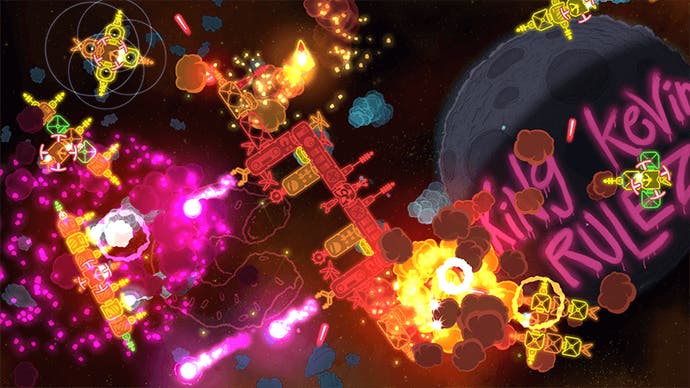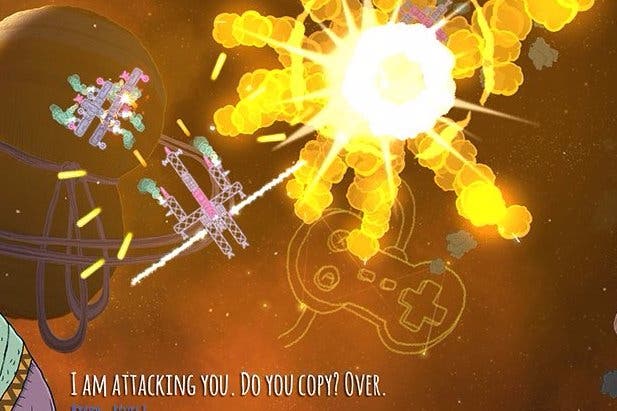Captain Forever Remix: Invasion of the Saturday morning cartoons
Farbs far away...
If you've played much of Captain Forever, you'll know that it can be hard to say exactly when a design starts to come together. Jarrad "Farbs" Woods' gloriously stark browser game blends creation and destruction from the moment you first load it up. This is a game about building spaceships by blasting other spaceships to pieces. Once a battle's finished, you switch from a soldier to a scavenger, an engineer, rooting through the wreckage and clamping anything useful you find onto your chassis. Ten minutes in, your craft will likely be a true beast of the cosmos. But the design of that craft? How does it start? Who really shapes it? Hard to say. Hard to say.
Fitting, then, that when I ask how Captain Forever Remix came about, nobody can provide an answer. "The idea was really an accident," says designer Dean Tate eventually. "It wasn't my idea. Or Brian's. Or Jarrad's."
Brian is Brian Chan, Tate's co-designer on Remix. The pair met at Harmonix, although they were on different teams back then. Tate's worked on games like BioShock 1 and 2, and he lead the design on Dance Central. Chan's been involved with Plants vs Zombies and Pandemic's Mercenaries games. Eventually, they tired of working in big organisations and decided to go indie. But how?

"We started kicking ideas around in earnest early last year, but nothing was really sticking," says Tate. "We also realized that we had a really tough battle ahead. Designing and building a new game that is an entirely new idea is outrageously hard. Learning a new set of skills is also outrageously hard. For this project it would just be Brian and I doing all of the code, art, marketing, business, and design. And then you've got to make the game really fast, because you're funding it yourself."
One day, Tate was talking to a friend and going over various potential ideas, when he switched from discussing a space game he had in mind to gushing about how much he loved Captain Forever. "You know, how amazing it is, how effortlessly unique yet simple the mechanics were, and so on," says Tate. "[I was] lamenting that it was going to be really hard to make something comparable while doing an indie project for the first time." Tate's friend asked why he didn't just approach Woods and ask if he could "borrow" the design for a bit. Tate couldn't think of a good answer.
It's not hard to see why this would be such a tantalising prospect. Few games of any stripe have the astonishing charisma and ambience of the original Captain Forever. With its tiny viewing window and sharp-edged neon graphics, this is outer space as it might appear to a lone pilot, hunched over the instrument panel, blasting away at a hostile universe teeming with progressively weirder and more deadly foes. I love the big stuff, like the way the game provides an endless up-ramp leading you higher and higher into the hierarchy of the cosmos with each gun you clamp on and each booster you add. I love the little stuff, too: the sizzle of a new bulkhead being welded to the existing design, that little flash of your own helmeted reflection you see in the screen every time you fire your guns. If this was simply a shooter, it would be wonderful, bright death swarming and flocking as you tumble through a Petri dish galaxy. If it was simply a ship builder it would be equally brilliant, as you churn out candle-studded death cupcakes and craft that can't wait to blow themselves to pieces. But it's both those things, and they mesh so harmoniously. Few games offer such immediate engagement.

"When Dean first pitched me this idea he called it Captain Forever HD," says Woods. Inevitably, the three designers spoke a lot about staying true to the original. Less inevitably, they were mostly discussing how to avoid that. "I think we both saw that as a burden, holding the project back," Woods continues. "I also began to worry that a straight-faced Captain Forever HD wouldn't be particularly Dean. A world with less Dean is a worth less worth knowing, so I counter-pitched the idea of a remix. I figured in a remix Dean could pack the world full of cartoon fun and break all the constraints of the Captain Forever universe. The original games, for instance, never acknowledge that they are in fact games. It seemed like a cool idea at the time, but is it ever limiting. With Captain Forever Remix, Dean and Brian can forget about stuff like that."
Armed with the creative freedom they needed, Tate and Chan started in on the look and feel of Captain Forever, creating an entirely new universe and characters to populate it. "You play as Natalie Norberry, a school kid who has a secret alter ego: Saturday morning cartoon hero Captain Forever," explains Tate. "You explore a messed-up solar system, on the hunt for your little brother who has become a massive, all-powerful, pink bubblegum freak who has turned all of Earth's animals into super-mutants heck-bent on your destruction. So basically we're making a Saturday morning video game."
All of which provides Remix with a striking, wonderfully puerile aesthetic that instantly seems to work. Travelling the solar system, one planet is covered in gloopy green snot. Another has been torn in half, a jagged paper tear separating the hemispheres. When enemies announce themselves, they're stubbly, wonky-eyed and characterful: a spider is wearing eight-lensed 3D specs, a boar-type thing has jutting gnashers.
Saturday morning cartoons have also fed into the rest of the game, providing a pulpy planet-hopping narrative as you progress through this strange, unpredictable roguelike, grabbing great loot and then losing it all in seconds. "There are tons of changes and additions to the original formula, both large and small," says Tate. "The way you progress through the game feels completely new, as you travel from planet to planet in the solar system. There are new modules, such as the Ripsaw (a melee buzzsaw weapon) and the Lazer Beam (a beam weapon that can cut through ships). You will die often, but when you die you'll have the chance to come back next game and get revenge on the enemy that destroyed you."
"We've added a completely new metagame too," he explains, "centering on the idea of Starter Kits. Each time you start a game, you get to select a set of modules to build your ship out of, and that'll influence which modules enemies use against you. You can unlock new Starter Kits, and earn points each game that you can then spend to upgrade various bonuses for each Starter Kit. So there's a lot of depth here that wasn't in the original, but also doesn't break the magic formula that makes Captain Forever so great. It's definitely been a challenge to tweak and change that original formula without breaking it, but I think that's exactly what we've done. It feels like a new game, but also very familiar."

And what's it been like for Woods, to see his own game remixed in unusual ways? "It's been great watching the game expand in directions I'd never imagined," he says. "That part has been wonderful. The scary part was watching Dean and Brian rebuild the game from scratch. I think moving to Unity was the right choice, but it meant taking a huge leap backward, and it was months before they had something comparable to the original again."
It's become something of a feedback loop, in fact - another idea that feels strangely apt given Captain Forever's constant cycling between creation and destruction. "They've just kept on motoring," says Woods, who is still working on Captain Forever games himself. "In our regular catch-ups I'm now hastily scribbling notes, trying to track all the cool stuff they've done that I want to merge into my own work."


